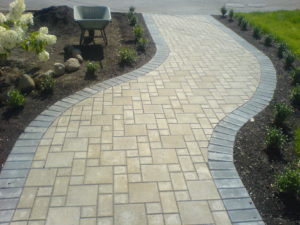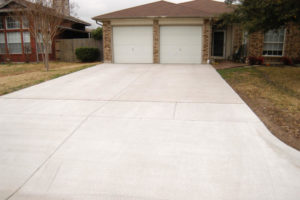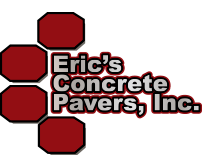What Qualifies as Beauty in a Driveway?

Where’s the Brawn: Concrete or Driveway Pavers?
Concrete vs. Concrete Pavers
• One thing to remember is that whether plain or stamped, concrete is concrete. Though stamped or stained concrete is attractive, it’s still the same concrete as a regular driveway. You also have higher labor costs for installation and all the problems inherent with concrete.
• Concrete usually runs between 3500 – 4500 PSI (pounds per square inch). The recommendation is 4000 PSI. Concrete cures to its required strength in 28 days. It acquires about 70% of its required strength in 7 days. That means you can drive your typical family car on it in a week, though don’t drive on a corner or an edge. Your pick-up or van? Better wait a month.
• Unlike pavers, even after curing, typical concrete drives are prone to cracking, particularly on a driveway’s edges, but many times at random places.
• Repairing cracked or broken concrete is very difficult. You have to saw out the entire broken area. Then you need to match the right color, consistency, and finish.
• Concrete, even stamped concrete, can be slippery when wet and a fall hazard. Keep in mind the conditions your driveway will be subjected to: rain, snow, ice, water from lawn watering or car washing, etc.
• The up-front costs of concrete are the least expensive between the two. It runs about $4-6 per square foot installed. Stamped concrete costs about $8-22 per square foot installed. It depends on where you live, what finishes and colors you choose, etc.
Concrete Pavers

• A combination of water, portland cement, sand, and gravel go into making interlocking concrete pavers for your driveway. They are more porous than plain concrete and the interlocking feature prevents pavers from rotation or side-to-side slippage. Once in place, they stay in place.
• Pavers are load-bearing to 8,000 PSI +/- (Compare this to the PSI for concrete). Because they have no need to cure, they can be driven on immediately.
• If a paver does crack or becomes discolored, you can replace it with little work and cost.
• If you need to run utility lines or television/internet cables under the driveway, you just have to take up a few pavers, run the lines, and lay them back down. Concrete must be sawn out and poured again leaving seams and a difficult color and texture match.
• You can add a more textured look with pavers for driveway with grass. Spaces between pavers are allowed to fill with grass or moss. Mowing is easier than with a concrete drive: just mow right over the pavers. No edging needed.
• Harsh weather conditions are not an issue with pavers. Due to their absorbency, most water leaches through which is environmentally friendly and also good if you’ve gone with driveway pavers with grass. Also, the absorbency doesn’t allow water to pool making it less slippery and more difficult for ice to form.
• Average cost of pavers runs from $4-20 per square foot installed depending upon your location, type of pavers selected, etc.
Conclusion
Why go for “acceptable” and put in an ordinary concrete driveway? Ramp up the wow power of your home’s curb appeal and add value to your property with the use of beautiful, durable driveway pavers. Want another dimension? Tie the pavers used in your driveway into sidewalks and patios. There’s nothing that will say “quality” like a home whose driveway and walkways are finished with pavers.
Excited to find out more? Contact us to learn how to showcase your home.
References
Balogh, Anne. (n.d.). Stamped Concrete Versus Other Paving Materials. Retrieved fromhttp://www.concretenetwork.com/stamped-concrete/comparison.html
Concrete Pavers Versus a Poured or Stamped Concrete Patio in Somers, NY. (2010). Retrieved fromhttp://unilock.com/concrete-pavers-versus-a-poured-or-stamped-concrete-patio-in-somers-ny/
Snyder, James. (2010, Mar 06). What is Better? – Pavers vs. Concrete. Retrieved fromhttp://www.albertgrouplandscaping.com/our-blog/bid/17556/What-is-better-Pavers-vs-Concrete

Hi! Brilliant article! It really was a pleasure to read… I’m a little confused though. What is a “paver” verses a concrete paver? … Admittedly, I don’t really know too much about paving but… Maybe you can explain it to me?